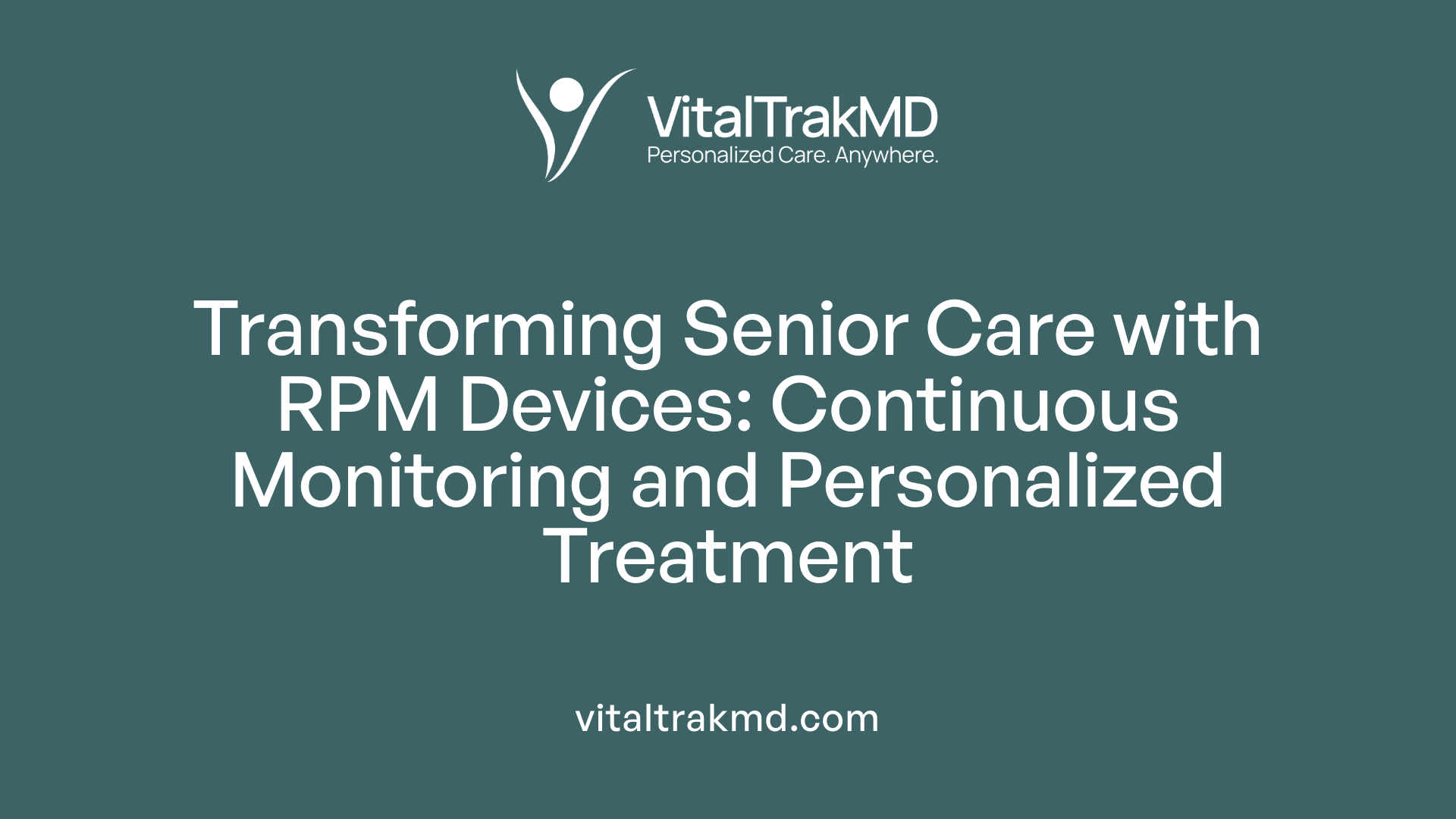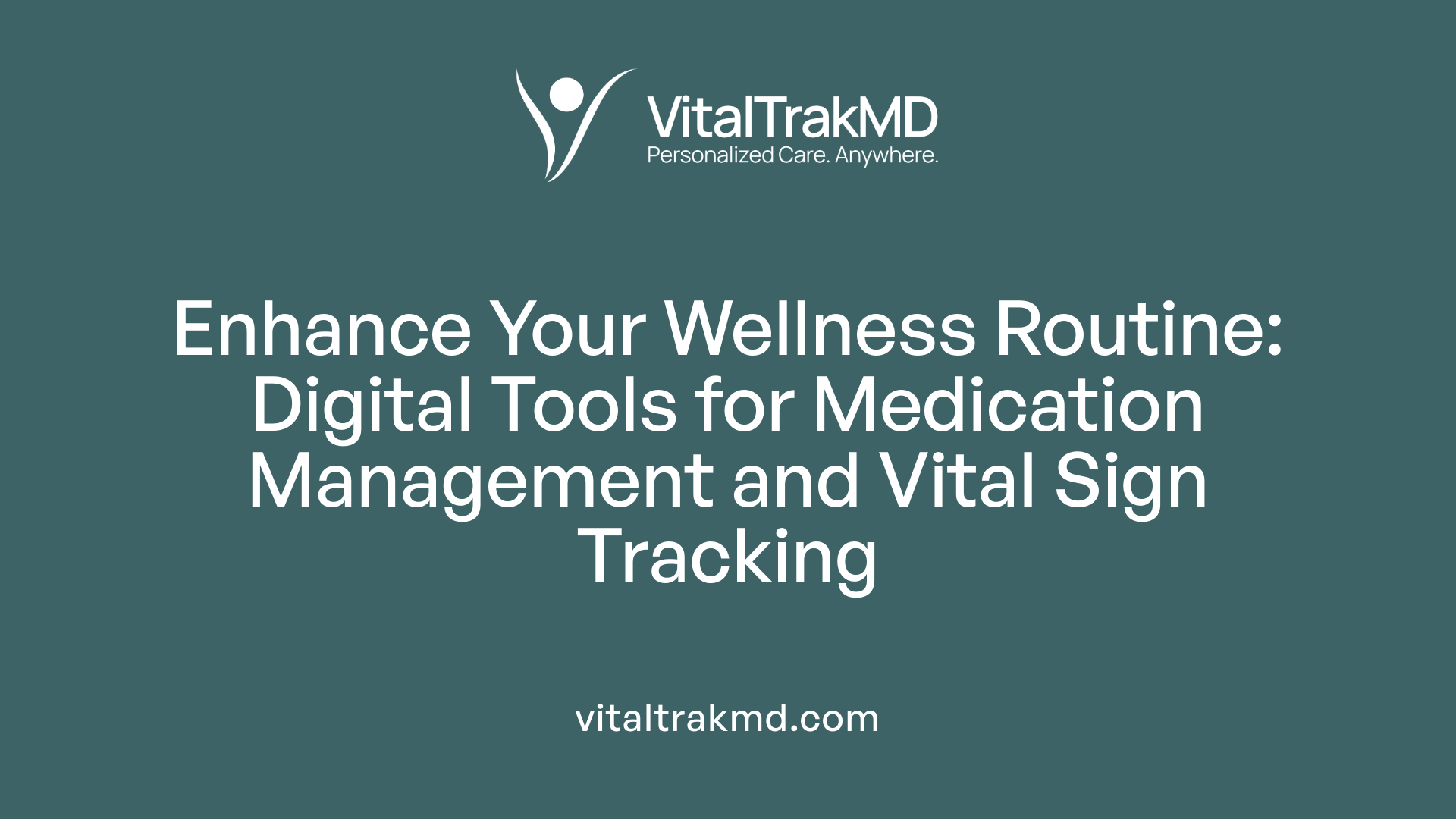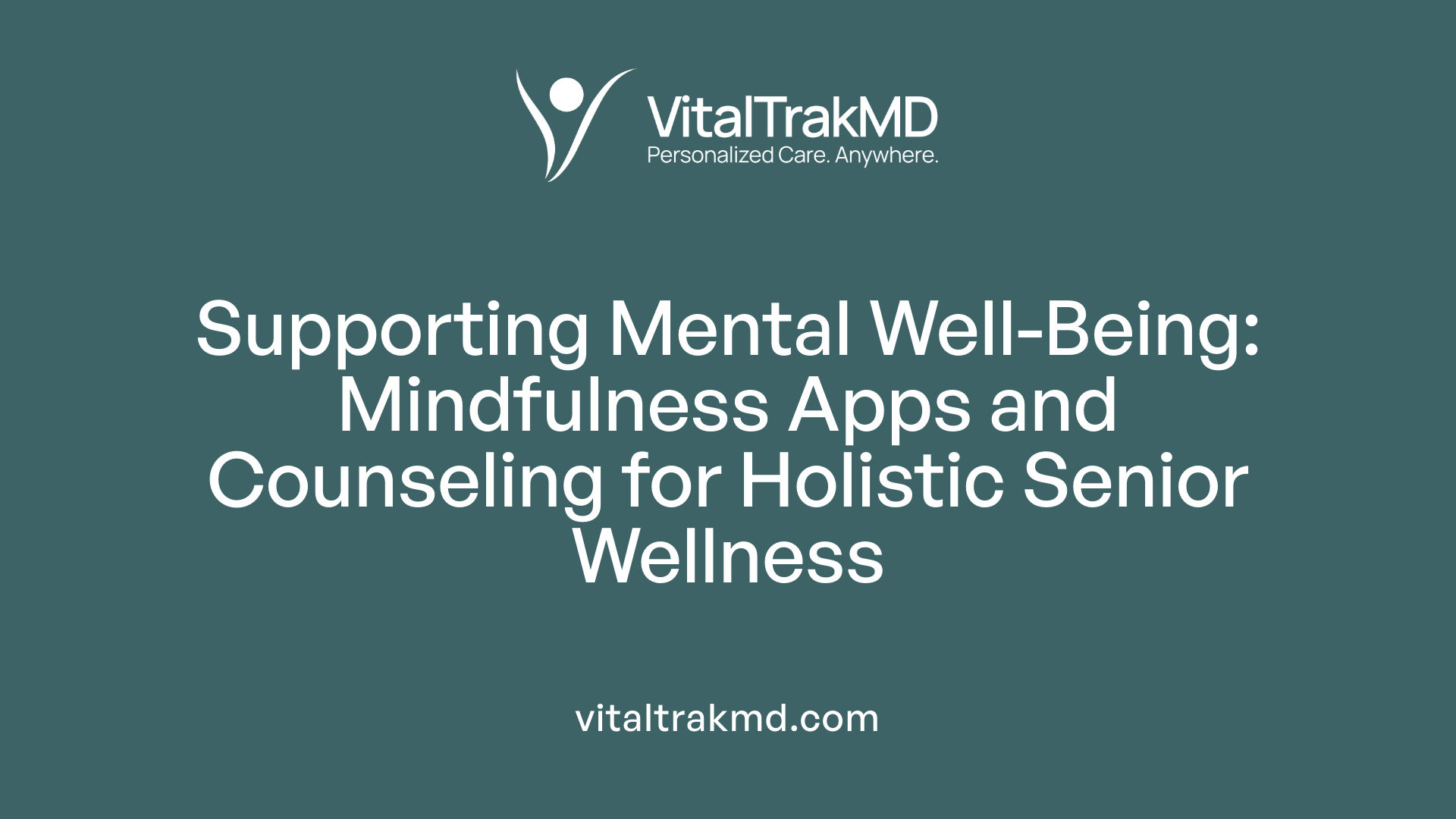Supporting Seniors With Tools for Daily Health Monitoring

Empowering Independence Through Daily Health Monitoring
As the senior population continues to grow, maintaining health and independence becomes a paramount concern. Advances in remote patient monitoring and digital health tools offer unprecedented opportunities for seniors to engage proactively with their wellness. This article explores how technology empowers seniors to take control of their health, supports sustainable lifestyle changes, and integrates mental well-being into holistic care programs, ultimately enhancing quality of life and promoting longevity.
Remote Patient Monitoring: Revolutionizing Chronic Disease Management for Seniors

Role of RPM devices in chronic disease management
Remote Patient Monitoring (RPM) devices are transforming how seniors manage chronic diseases by offering continuous health data in real time. This constant stream of information enables healthcare providers to make proactive, timely decisions, improving the personalized care seniors receive.
Key RPM devices supporting seniors
Important RPM tools include blood pressure cuffs that monitor hypertension and related conditions, glucometers for daily diabetes management, and pulse oximeters tracking oxygen levels crucial for heart and lung health. Additionally, wearable ECG devices and stethoscopes detect cardiac irregularities early, while activity trackers help seniors stay engaged with their daily routines.
Benefits of real-time data sharing with clinicians
Real-time data transmission ensures clinicians can promptly adjust treatment plans, reducing the risk of complications and hospitalizations. This ongoing connection encourages seniors to stay engaged with their health and supports better adherence to treatment.
Impact on conditions like hypertension, diabetes, heart and lung diseases
RPM devices significantly aid in managing widespread senior health issues such as hypertension, diabetes, congestive heart failure, and chronic lung diseases. Accurate and timely monitoring helps seniors and their providers detect problems early, optimize medications, and promote healthier lifestyle choices.
What are the most effective wellness programs for sustainable weight loss?
RPM devices enhance wellness programs by providing data that complements balanced nutrition and physical activity efforts. When used alongside lifestyle programs, these tools help seniors manage conditions effectively, supporting sustainable weight loss and long-term health.
Digital Tools Enhancing Medication Adherence and Daily Health Engagement

Medication reminder apps and their features
Medication reminder apps like MediSafe and Pill Monitor play a crucial role in helping seniors manage their medication schedules. These apps allow users to input detailed medication information and send timely reminders to take doses on schedule. Features include alerts for missed doses and progress reports that can be shared with healthcare providers to ensure adherence and effective medication management.
Tracking health metrics with wearable devices
Wearable devices complement medication management by providing continuous monitoring of vital health metrics. Devices such as the Apple Watch Series 10, Fitbit Charge 6, and Garmin Forerunner 965 track heart rate, physical activity, sleep patterns, and stress levels in real time. This data supports proactive health decisions and encourages seniors to stay engaged in their wellness routines.
User-friendly app features for seniors
For digital tools to be effective among older adults, apps need to prioritize ease of use. Important features include large text, simple navigation, clear alerts and reminders, and the ability to customize settings. Integration with wearable devices enhances data collection, while responsive customer support addresses user challenges, making technology accessible and beneficial for seniors.
Data sharing with healthcare teams
Many health apps and wearables allow users to share collected health data seamlessly with their healthcare providers. This connectivity fosters informed clinical decisions and personalized care. By enabling real-time updates on medication adherence and vital signs, these tools bridge communication gaps and support ongoing health monitoring.
How do care programs support individuals in achieving their wellness and weight loss goals?
Care programs for seniors increasingly leverage digital tools such as medication reminder apps like MediSafe and Pill Monitor, which help maintain adherence to complex medication regimens. Wearable devices track vital signs and physical activity, providing feedback that fosters motivation and accountability. By integrating these technologies into personalized care plans, programs ensure consistent support, encourage behavioral changes, and bridge communication between seniors and multidisciplinary healthcare teams for holistic wellness management.
Incorporating Mental Health Support in Senior Wellness Programs

What role does mental health play in successful weight loss and wellness programs?
Mental health significantly impacts the success of weight management and overall wellness in seniors. Conditions such as stress, anxiety, and depression can reduce motivation and lead to emotional eating, undermining weight loss efforts. Addressing mental well-being supports the development of healthy habits and helps seniors maintain positive lifestyle changes.
Apps offering mindfulness and stress reduction
Digital tools like Headspace and Calm provide guided meditation, breathing exercises, and relaxation techniques specifically designed to reduce stress and improve mental health. These apps empower seniors to practice mindfulness, helping manage emotional triggers that affect eating and motivation.
Counseling and behavioral therapy integration
Incorporating behavioral counseling and therapy into wellness programs allows seniors to develop coping skills and strategies to overcome barriers such as emotional eating or low motivation. Support from professionals fosters resilience, helping individuals adhere to their health goals more effectively.
Addressing emotional eating and motivation challenges
Programs that combine mental health support with physical activity and nutrition education can better combat emotional eating. Tools such as food diaries can identify emotional triggers, while motivational aids like digital reminders and progress tracking encourage consistent engagement and reinforce positive behaviors.
Lifestyle Modifications for Long-Term Wellness and Weight Management

Which lifestyle changes are most recommended by experts for long-term wellness and weight management?
Experts emphasize a combination of dietary habits, physical activity, adequate sleep, and stress management to maintain health and control weight over time.
Adopting a balanced diet is foundational. This means prioritizing fruits, vegetables, whole grains, lean proteins, and low-fat dairy while reducing intake of sugars, saturated fats, and sodium. Nutrition apps like MyFitnessPal and Mealime aid seniors by tracking food intake and offering customized meal plans that consider dietary needs such as low-salt or diabetic-friendly options.
Regular physical activity is vital. Guidelines recommend accumulating at least 150 minutes of moderate-intensity exercise weekly, including strength, balance, and flexibility workouts suitable for older adults. Apps like Go4Life and SilverSneakers GO provide accessible exercise routines tailored for seniors. Fitness trackers such as Fitbit Charge 6 monitor daily steps, heart rate, and sleep quality, encouraging consistent activity.
Sleep and stress management also contribute significantly to overall wellbeing and healthy weight maintenance. Dedicated sleep monitors like the Oura Ring 4 help users optimize sleep patterns, while mindfulness apps such as Headspace and Calm teach relaxation techniques, meditation, and breathing exercises to manage stress effectively.
Setting realistic goals and tracking progress are essential for lasting success. Using digital tools to monitor diet, exercise, and sleep creates visual feedback and motivation. Consistent self-monitoring—through food logs, exercise records, and regular weigh-ins—helps identify patterns and modify behaviors. Technology-enabled reminders and alerts support adherence, while integration with healthcare providers can enhance personalized care.
Together, these lifestyle modifications, supported by smart technology, empower seniors to take control of their health, supporting long-term wellness and sustainable weight management.
Weight Loss Support Through Structured Care Programs and Digital Integration
Components of effective weight loss programs
Successful and sustainable weight loss involves a multifaceted approach. Programs like Kaiser Permanente's Healthy Balance emphasize a blend of healthy eating, regular physical activity, behavioral therapy, and ongoing education. Participants receive tools such as diet-tracking apps and digital scales that simplify monitoring food intake and weight changes. A balanced diet rich in fruits, vegetables, whole grains, and lean proteins complements physical activities, while strategies for managing stress and optimizing sleep reinforce lasting lifestyle changes.
Role of care teams and coaching
Personalized support from multidisciplinary care teams is essential. These teams offer wellness coaching, guidance on developing healthy habits, and encourage regular progress tracking through lifestyle logs and workshops. Specific programs prepare individuals for bariatric surgery and provide vital post-surgery assistance, including vitamin supplementation and strategies to avoid cross-addiction. This structured approach helps address physical, emotional, and behavioral aspects of weight management.
Digital tools fostering adherence
Digital health solutions play a significant role by enhancing engagement and consistency. Users benefit from apps that make calorie counting, nutrient tracking, and physical activity monitoring straightforward. Features like reminders, progress visualization, and social networking aspects maintain motivation without the need for in-person coaching. Devices such as smartwatches and fitness trackers support self-monitoring and provide real-time data, which correlates with greater weight loss success compared to traditional methods.
Programs addressing metabolic and bariatric surgery needs
Specialized care programs focus on metabolic and bariatric surgery patients by offering pre- and post-operative counseling, nutritional supplementation guides, and behavioral support. These services address unique challenges like nutrient deficiencies and adjustments in lifestyle required after surgery, ensuring improved long-term outcomes. Integrating these programs with digital tools adds convenience and continuous engagement for patients managing complex weight-related conditions.
| Aspect | Description | Examples and Benefits |
|---|---|---|
| Nutrition and Activity | Balanced diet plus moderate physical activity | Improved health markers and weight control |
| Care Team Support | Coaching, education, and personalized feedback | Better adherence and holistic management |
| Digital Tools | Apps for tracking diet, activity, medication, and weight | Increased motivation and accessible self-monitoring |
| Surgical Support Programs | Pre- and post-bariatric surgery guidance | Enhanced recovery and prevention of complications |
The Future of Senior Health Monitoring: Integrating Wearables and Smart Technologies
Latest wearable devices and sensors
Advancements in wearable technology have introduced a range of devices specifically designed for seniors. Products like the Apple Watch Series 10 and Garmin Venu 3 provide continuous heart rate monitoring, ECG capabilities, blood oxygen measurement, and fitness tracking. Similarly, smart rings such as the Oura Ring 4 and Ultrahuman Ring Air offer discreet health tracking with activity, sleep, heart rate, and temperature sensors. Ear-worn devices also provide unobtrusive monitoring of key vitals.
Continuous monitoring of vital signs
Continuous remote patient monitoring (RPM) devices enable real-time insights into a senior's health, allowing proactive clinical decisions. Blood pressure cuffs like the Omron Evolv are portable and wirelessly send cardiovascular data to healthcare providers. Continuous glucose monitors such as the Dexcom G7 provide real-time blood sugar readings synced to smartwatches. Sleep monitors like the Oura Ring 4 analyze sleep stages, respiration, and heart rate variability, which are crucial for managing chronic conditions and improving overall wellness.
Integration with health apps and care programs
These wearable sensors seamlessly integrate with comprehensive health apps to track medication, nutrition, physical activity, and mental health. Apps like MediSafe and Pill Monitor send reminders and log medication adherence, while exercise programs like SilverSneakers GO tailor workouts to seniors' abilities. Technology integrated care programs in senior living communities offer guidance to ensure these tools are used effectively and safely, fostering independence and improved health outcomes.
Benefits of discreet and user-friendly designs
Designs for senior wearables emphasize ease of use with simple interfaces, large displays, and minimal buttons. Discreet devices such as smart rings and earbuds promote continuous use without stigma or discomfort. The small form factors and wireless connectivity allow seniors to monitor their health effortlessly throughout the day, encouraging consistent engagement and timely self-management.
| Feature | Examples | Benefits for Seniors |
|---|---|---|
| Wearable Devices | Apple Watch Series 10, Oura Ring 4 | Continuous vital sign tracking, discreet use |
| Sensors | ECG, SpO2, accelerometers | Early detection of conditions, activity monitoring |
| Health Apps | MediSafe, SilverSneakers GO | Medication reminders, tailored fitness programs |
| Care Integration | Senior living technology programs | Support, education, and enhanced care coordination |
The integration of advanced wearables and smart sensors with user-friendly technologies is transforming senior health management into a continuous, comprehensive, and personalized experience.
Empowering Seniors Through Technology and Holistic Care
Technology-driven tools and structured care programs play a transformative role in supporting seniors’ health and wellness journeys. Remote patient monitoring devices, digital health apps, and wearable technologies enable daily engagement and proactive management of chronic conditions. When integrated with personalized care plans addressing mental health, nutrition, physical activity, and behavior modification, these resources support sustainable weight management and overall well-being. As innovations continue to evolve, they promise even greater accessibility and impact, helping seniors maintain independence, improve quality of life, and achieve long-term health goals with confidence.
References
- 7 Common Remote Patient Monitoring Devices
- Best Health Apps for Seniors | Lewes, DE
- 4 Best Mobile Apps To Improve Senior's Overall Health
- Top 10 Everyday Devices Using Medical Monitoring
- Weight Management
- Digital health tracking tools help individuals lose weight, study ...
- Self-Monitoring - The Way to Successful Weight Management
Recent articles
Want to Feel Better and Live Healthier?
Join hundreds of patients taking control of their health with personalized care that fits their life – not the other way around.
Rated 4.8/5 by 32+ customers







